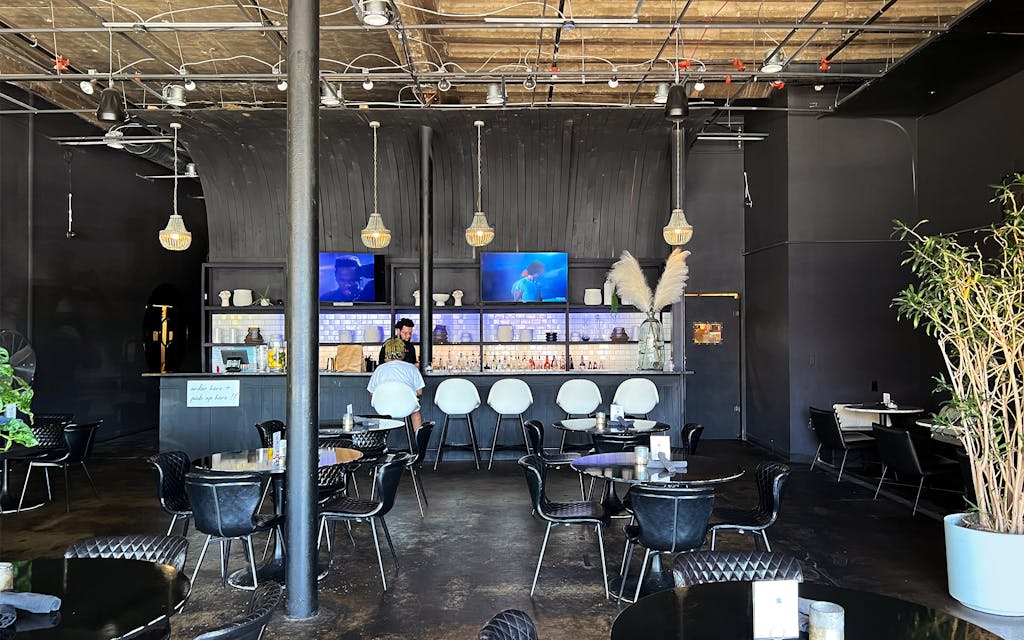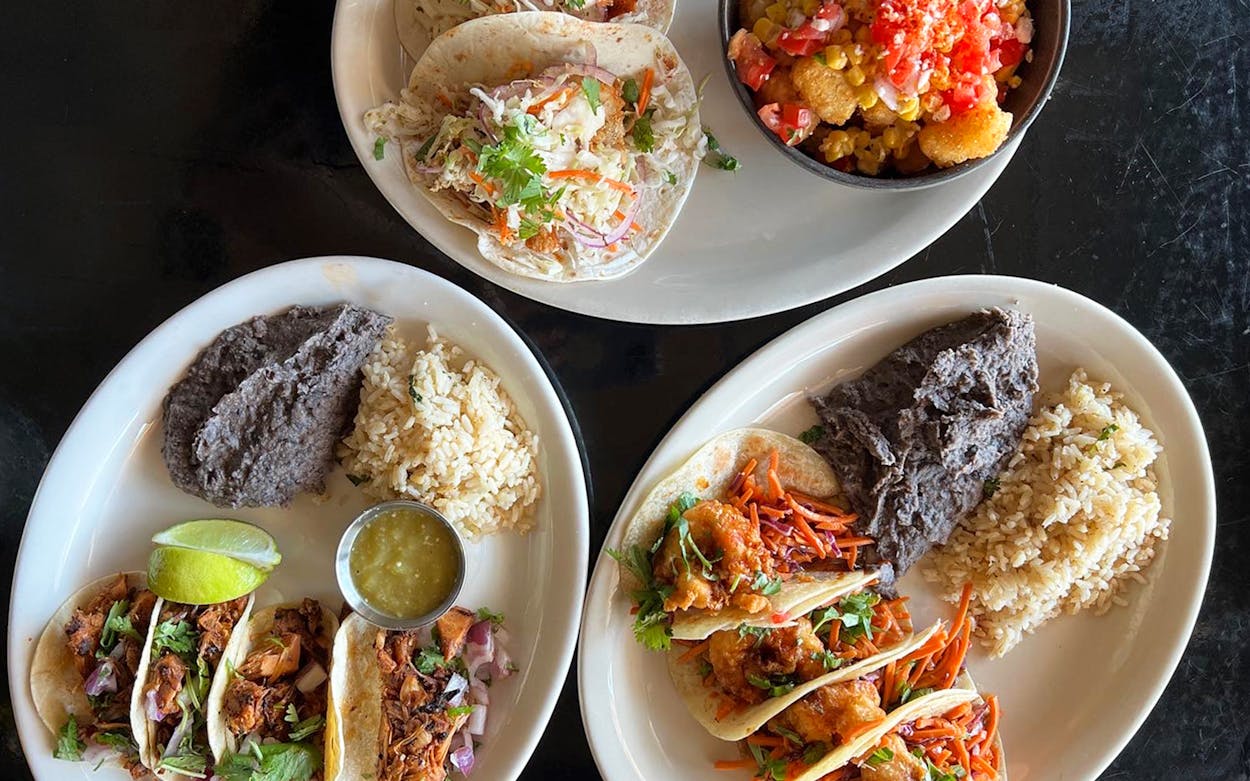Elizabeth Anderson didn’t enjoy the taste of meat growing up. Although she was raised on Tex-Mex, she eventually turned to a vegetarian diet, in 1995. Years later, as the native of Dallas’s Oak Cliff neighborhood was starting a family, Anderson gave up dairy and eggs, going completely vegan. Her husband, Anthony Bookman, followed suit. Anderson began to consider how she wanted to raise the son she they would eventually have, what to teach him, and how she could make a better life for him. “I feel like the whole planet is connected,” she says. “And I thought I just needed to do everything I could to make [it] a better place for my son and to teach him that and be a living example of that.”
In 2019, with little restaurant experience aside from a stint as a partner in another vegan venture, Da Munchies, Anderson opened the meat-free, Creole-focused Vegan Food House in a converted Craftsman-style home in Dallas’s Bishop Arts District. Anderson lived in the neighborhood and was able to easily go back and forth from home to work. Vegan Food House was packed when I visited with my vegetarian wife. The missus enjoyed it. I did not. The food was a disaster, especially the flour tortillas, which could’ve easily been mistaken for bleached corrugated cardboard. Fortunately, the Mexican food offerings were few amid a large menu.
Then, in 2021, Anderson and Bookman opened Casa del Vegano, using a Spanish-language translation of its sister restaurant’s name. I wasn’t in a rush to try it, given my previous experience. Turns out that Casa del Vegano’s fare isn’t atrocious, but the dining experience isn’t exactly stellar either. Yet there is abundant potential for greatness.
First, let’s acknowledge how difficult it is to open and operate a vegan food business in Oak Cliff. Although the neighborhood is gentrifying, attracting a more affluent white demographic, the community is predominantly Latino and Black. Dining options overwhelmingly favor Tex-Mex and Mexican, specifically beef-focused northern Mexican food. Anderson acknowledges the difficulties. “This has been a hard one for us,” she says. The restaurant sits along the Jefferson Boulevard commercial district with colorful facades housing quinceañera shops, party supply stores, and Mexican restaurants. The establishments draw Latino residents who are more often than not unfamiliar with the vegan options Casa del Vegano offers. “The people from the neighborhood are looking to eat along this strip,” Anderson says. “So sometimes they walk in and they walk out. Sometimes they love it.” It doesn’t help that Trompo, a taqueria specializing in the namesake Monterrey-style specialty, opened in the space next door in September.

There is much to enjoy at Casa del Vegano, even if individual dishes—and some parts of the experience—left me frustrated. My favorite platter was the Dragon Roll taco plate. The quartet of flour tortillas bore one piece of tender tempura-fried konjac root that glistened with an orangey red coating evocative of sweet-and-sour chicken. The Asian tuber curled almost completely into itself, much like the shrimp it was meant to mimic, and sat atop a mix of carrot strips and red cabbage with a sprig or two of cilantro. Unfortunately, the tacos look half full. The plate is $15, and I would gladly have paid a dollar or two more for an extra piece of konjac root—it’s that good. Meanwhile, the barbacoa tacos swapped beef cheeks for jackfruit. The fruit, which shreds into a meaty consistency, was dry but was a dead ringer for the genuine item in terms of flavor.
The Chihuahua Fried Chick’em tacos used oyster mushrooms, fire-hued and irregularly chopped to resemble chicken strips. The filling was topped with a messy slaw that had a good crunch from the carrots and cabbage. Overall, the Chick’em tacos, a special of the day, were a bit disappointing. From the menu description, I assumed the elote tater tots would also be served in tortillas. Instead, the side dish was brought to the table in a large bowl, with the elote covering the tater tots. The corn kernels slipped to the bottom of the vessel, making me wish this was served in the tacos with which it was presented.
The fact that most of the dishes used produce instead of soy- and gluten-based replacements to simulate proteins was refreshing. It shows that Anderson has a real talent for cooking. The scallop taco employs squat slices of trumpet mushrooms that expertly stand in for the namesake mollusk; banana blossoms approximate catfish in the “catfish” tacos; and oyster mushrooms are an uncanny replacement for milanesa in tortas. But Anderson isn’t opposed to using replacements such as Beyond Meat, which appears in the deep-fried chimichanga. A soy product is the “beef” filling in the street tacos, which are served in stiff, overly sweet corn tortillas. Anderson could do better when it comes to the tortillas, which are not made in-house or purchased from nearby businesses.
The flour tortillas were better than the corn, even though both are purchased from restaurant-supply distributors. The reliance on commodity tortillas undermines the freshness of the other foods. It would be better for Anderson and Bookman to source flour tortillas from the Sonora-style La Norteña and corn tortillas from nixtamal specialist Araiza Tortilla Factory, both of which are located in Oak Cliff.
The restaurant’s service model is aggravating. Customers are directed to scan a QR code at their table to order and pay. There is minimal staff interaction. If you have questions regarding certain dishes or have made some sort of error, good luck getting answers. In the written descriptions of some of the dishes, it’s hard to tell what comes in the taco versus what’s on the side. Anderson admits that the ordering and payment method is difficult for some diners, but she’s sticking to it in the same way she’s dedicated to sharing her vegan interpretation of Mexican food.
By serving Tex-Mex, Casa del Vegano distinguishes itself in the growing movement of Black-owned, Dallas-area vegan restaurants and food establishments, Da Munchies and Vegan Food House among them. Other popular spots include Irving-based Bam’s Vegan, which pops up at the Dallas Farmers Market on weekends alongside Vegan Vibrationz, which is slated to open in the tony Legacy Food Hall in Plano by the end of the year. Soulgood is a roving food truck.
The mere fact that Casa del Vegano serves vegan Tex-Mex might suggest to some that Anderson is appropriating regional and international foodways. “Sometimes you can be doing things you don’t realize that you’re doing,” Anderson says, admitting that the line can be fuzzy. But I think those critics would be wrong. Her clientele includes Mexicans and Mexican Americans; she employs Latinos, including prep cook Eva Hernandez; and Anderson is quick to point out that African influences are present in Mexican food, especially in the Caribbean coastal regions. And let’s not forget African American contributions to Texas cooking. Tex-Mex is not—contrary to popular thought—inherently white peoples’ food. Eating meat was and is rare for many Mexicans, who rely on a lot of vegetables and vegetable proteins in their diet. Anderson is also staying true to herself and her Oak Cliff upbringing. That alone is refreshing and something of which she should be proud.
Casa del Vegano
333 W. Jefferson Boulevard, Dallas
Phone: 972-685-3003
Hours: Tuesday–Thursday 11:30–9, Friday–Saturday 11:30–10, Sunday 11:30–7








